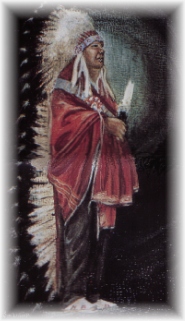Kay County, OK
 The lands in the area of Kay County and surrounding the present Kaw Lake were once claimed by the Osage Indian Nation. Controversies about this claim let to the ratification of a treaty in 1870 forced the Osage east into what is now Osage County. In 1871, a Congressional Commission and a delegation of Kaw Indians selected the northeast portion of the former Osage holdings as a future home for the Kaw Indians. Chief Washungah, or Washunga, both spellings are correct, led 516 Kaw Indians from Council Grove, Kansas to the 100,000 acres set aside for the Kaw Reservation.
The lands in the area of Kay County and surrounding the present Kaw Lake were once claimed by the Osage Indian Nation. Controversies about this claim let to the ratification of a treaty in 1870 forced the Osage east into what is now Osage County. In 1871, a Congressional Commission and a delegation of Kaw Indians selected the northeast portion of the former Osage holdings as a future home for the Kaw Indians. Chief Washungah, or Washunga, both spellings are correct, led 516 Kaw Indians from Council Grove, Kansas to the 100,000 acres set aside for the Kaw Reservation.The old settlement of Washungah is located within the Federal Corps of Engineers project lands of Kaw Reservoir. It was the site for the Kaw Agency, Kaw Cemetery, and a trading post. Included among its buildings were a boarding school dormitory, infirmary, the superintendent's home and the school which later became the Kaw Council House. The council house has been moved to higher ground and reconstructed, stone by stone, and is now listed on the National Register of Historic Places. The Kaw Cemetery was also relocated to a higher elevation and is now located near the city of Newkirk, Oklahoma.
Another historical site located on the corps lands is the Deer Creek archeological site located in the vicinity of Traders Bend Park area. This site, which is also listed in the National Register of Historic Places, is believed to represent an early French trading post and Indian village. The French first entered the area in 1719, and shortly thereafter, trade with the Indians was established.
Other points of historical interest located in the county are the famed "Pioneer Woman" statue and museum and the Marland Mansion, both of which are located in Ponca City. Also located seven miles southwest of Ponca City is the site of the once sprawling famous 101 Ranch "White House." This was once one of the world's largest ranches and was often visited by Presidents and Kings and the rich and famous from all points of the world.
In 1902 "Old Kaw City," now inundated by the waters of Kaw Lake, was founded as a farming community in the fertile oxbow bend of the Arkansas River. It later became a booming oil town when oil was discovered nearby. Today, a new Kaw City is located on higher ground near the lake.
Explore Kay County
McCarter Museum
In 1997, the Tonkawa Historical Society purchased a building in downtown Tonkawa to house a museum. Ideally located directly across from Centennial Park, the McCarter Museum of Tonkawa History was opened on July 4th, 1997. The innovative interior layout was designed to tell a series of "stories." Tonkawa, OK Museums
Electric Park Pavilion
The Electric Park Pavilion, listed on the National Register of Historic Places, has always been the centerpiece of civic and social life in the community. This magnificent structure was constructed in 1912-1913
Blackwell, OK Historic BuildingsE.W. Marland
E.W. Marland was born May 8, 1874 in Pittsburgh, Pennsylvania. He studied to be an attorney, graduating from University of Michigan Law School at the age of nineteen. Marland?s years of practicing law led him to an interest in geology and a career in the oil industry. He prospered in
Ponca City, OK NotablesBotanical Garden & Arboretum
Northern Oklahoma College (NOC) is one of the most recent affiliate gardens of the Oklahoma Botanical Garden and Arboretum. Since its establishment in 1901
Tonkawa, OK ArboretumsBlackwell Armory
The Blackwell Armory with it Art Deco architecture was built in 1925, and is listed on the National Register of Historic Places
Blackwell, OK Historic BuildingsDerailed Railroad Co. Museum
- DISPLAY MOVED TO TOP OF OKLAHOMA MUSEUM, 303 South Main -
Blackwell, OK MuseumsStanding Bear Statue and Memorial Park
A monumental tribute to all Native Americans, this 22
Ponca City, OK ArtsLake Ponca
For maximum enjoyment, scenic Lake Ponca is divided into two areas -- one for sailboats and fishing, the other for motorboats and skiing. Outdoor lovers will enjoy a picnic, a campout, or a hike through the Nature Center.
Ponca City, OK Recreation